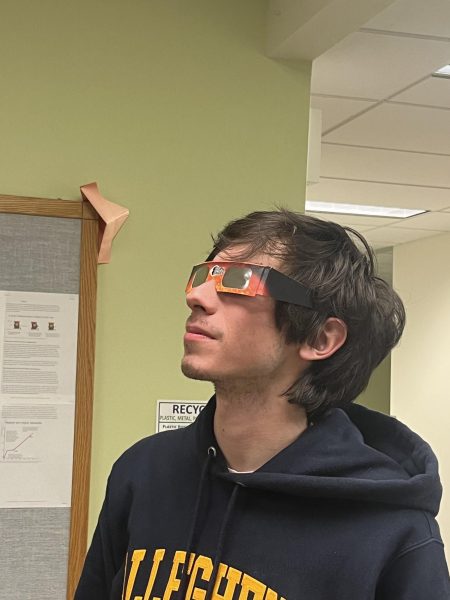Creek Connections holds annual research symposium
Allegheny College’s Creek Connections hosts its 21st student research symposium in the lobby of the Henderson Campus Center on Friday, April 29. This is the second symposium of the year where participating schools come and present their work.
“This year we have over 500 students coming. They will be taking over the campus center and they will be sharing what they did on their own. You will see things from people researching fish to doing experiments, all sorts of different things,” said Kala Mahen, ’19, a project assistant for the Creek Connections program.
Creek Connections is a program run through the college that works to assist the development of outdoor education and environmental science in schools.
“The main missions of Creek Connections is getting the students outdoors doing hands-on science education,” said Wendy Kedzierski, project director. “Our main goal is not necessarily to get everybody to be scientists, but our goal is to instill the environmental science knowledge in them so that when they become adults and are making decisions when they’re buying their house or doing different things on their land that they would be environmentally conscious citizens.”
The program works with about 50 schools throughout Western Pennsylvania from Erie down to Pittsburgh and with a couple schools from Ohio and New York. Nineteen of these schools are attending Friday’s symposium. Many of these schools are from the region around Allegheny. Creek Connections held another symposium on April 8 in Pittsburgh for the schools that are closer to that area.
The symposium acts as a capstone for the work that the schools do throughout the year. Levi Lundell, ’17, a project assistant, said the symposium is intended to help the students figure out what they’re interested in.
“The premise is that it’s bringing out environmental awareness, but they’re also being exposed to a professional environment,” said Lundell.
At the symposium, there are posters and oral presentations. The students from participating schools are divided into focus groups to work on hands-on science–based activities in the afternoon.
“We have environmental organizations also attend…so the students can talk to them,” said Kedzierski. “It’s a really good time to be able to talk one-on-one with those people.”
Creek Connections works with both middle schools and high schools with the majority of participants being high schoolers and the youngest being fifth graders.
“The schools that we work with, we give them the equipment necessary to do water quality monitoring on a stream near their school about monthly during the school year,” said Kedzierski. “Not only do we do that, but we offer to go and assist with that water quality testing throughout the school year.”
Kedzierski has 10 student workers who visit the schools and stream sites while they are doing their monthly water quality monitoring. While the program mostly does monthly monitoring, Creek Connections also works to assist other environmental organizations and aims to help science teachers in anyway they can.
“The teachers that we work with are kind of like our clients. We are there to enhance their science classes, to make it more engaging, more hands-on,” said Kedzierski. “We really like to get [the kids] outside, because that’s one of the barriers in a lot of the classes in the schools these days is that they don’t get outside very often. They don’t take as many field trips as they used to so we try to help with that.”
The program is funded through Allegheny College, grants from various organizations and foundations, and from private donations.
“What makes us unique is that constant interaction throughout the school year, that monthly water testing,” said Kedzierski. “It’s not just, ‘here’s how to do stuff’ at the beginning of the year and ‘check back with us at the end at the symposium and tell us how it went’. We have that constant interaction and I think that’s pretty unique.”
The idea from the program came from an environmental science class at Allegheny that saw the need for environmental education. Because of its size and reach, the program also has an educator located in Pittsburgh and has an agreement with Robert Morris University that helps to provide students to work with the schools in the Pittsburgh area.
“We teach them about watersheds and the importance of them to our community and to their lives,” said Mahen. “By teaching them the importance of their watershed and how important it is to life around us and conserving and protecting the water quality, it will do a lot of good for future generations to appreciate something that we take for granted and utilizing it for its great resources that we don’t always think about is really important.”
Mahen worked with the program before she came to Allegheny, participating in the water testing at her school from sixth to 12th grade.
“When I came to Allegheny, I said I wanted to get involved because I know a lot about the program,” Mahen said.
As well as the work that Creek Connections does with schools throughout the school year, the program also offers a Creek Camp in the summer.
The camp consists of two week-long sessions, with each session only admitting 12 participants.
“It’s a pretty intense week of aquatic ecology kind of based studies,” said Kedzierski. “We bring in…experts from other environmental organizations to lead sessions so it’s also a good career exploration time for high schoolers because they met lots of different people with jobs in the different science and environmental fields.”






